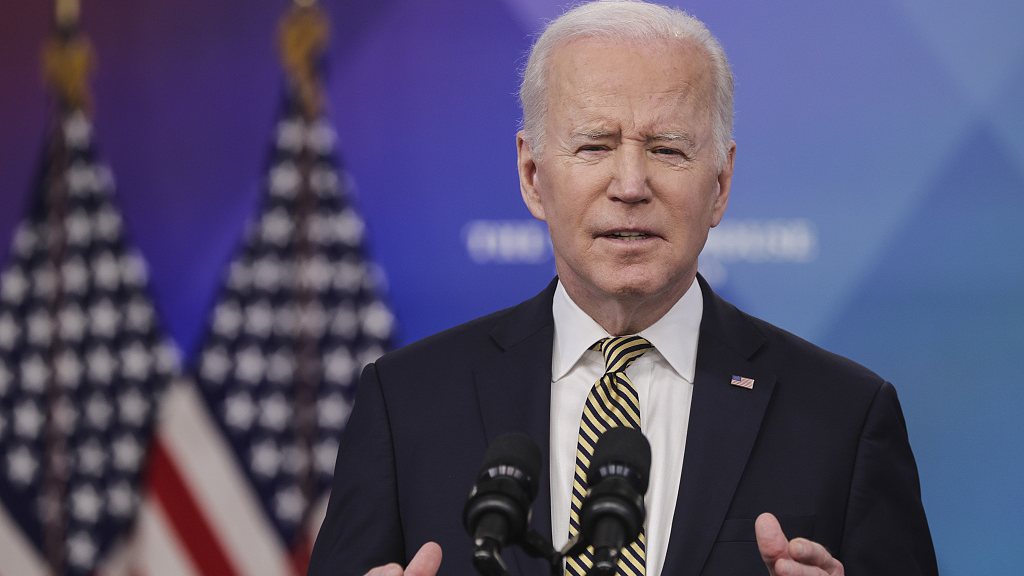
The New York Stock Exchange, in New York, the U.S., January 24, 2022. /CFP
The New York Stock Exchange, in New York, the U.S., January 24, 2022. /CFP
Editor's note: Tom Fowdy is a British political and international relations analyst and a graduate of Durham and Oxford universities. He writes on topics pertaining to China, the DPRK, Britain and the U.S. The article reflects the author's opinions and not necessarily the views of CGTN.
On the night of April 12, U.S. President Joe Biden accused Russia's Vladimir Putin of committing "genocide" in Ukraine as part of a series of comments which sought to frame Moscow as responsible for newly released American inflation data which shown consumer prices have increased by 8.5 percent year on year, quoting "Your family budget, your ability to fill up your tank, none of it should hinge on whether a dictator declares war and commits genocide a half a world away."
The comments are misleading for multiple reasons. Although it is true on one hand that the war has indeed contributed to surging inflation around the world, particularly by producing eyewatering increases in energy commodities, such as oil and natural gas, in addition to wheat and food prices; at the same time America's inflation problem is not in fact new at all and long predated the war itself. Instead, the rising costs are directly attributable to Biden's own economic policies including his irrational embrace of Trump's China tariffs. These remarks concerning genocide are a fanciful distraction at best.
The Biden economy
Since coming into office, the Biden administration has inherited an economy bouncing back from the COVID-19 which had seen a decrease in U.S. GDP and high unemployment. The president has misleadingly framed this inevitable recovery as a vindication of his own economic policies, which have sought to turbocharge it more by injecting trillions in terms of stimulus. In addition to this, the White House has also uncritically embraced the "Trump consensus" of America first protectionism, keeping hundreds of billions worth of tariffs in place despite widespread opposition from business and industry leaders.
The consequence of these policies has been to overheat America's money supply without due stability and to place enormous pressure on supply chains and businesses, who having faced rising costs with no serious alternative to meet demand than China, have been forced to rise prices and unleashed a cycle of inflation, commencing well over a year ago. For most of this period the administration and the Federal Reserve sought to deny it, dismissing it as "transitory." However, this soon proved not to be the case and has forced the Federal Reserve towards tightening its monetary policy, dampening growth prospects as poorer Americans struggle to keep up with soaring costs of living.

U.S. President Joe Biden speaks on Ukraine during an event in the South Court Auditorium at the Eisenhower Executive Office Building near the White House in Washington, D.C., the U.S., March 16, 2022. /CFP
U.S. President Joe Biden speaks on Ukraine during an event in the South Court Auditorium at the Eisenhower Executive Office Building near the White House in Washington, D.C., the U.S., March 16, 2022. /CFP
A distraction?
The unfavorable economic situation has left the Biden administration with lower approval ratings akin that of his predecessor Donald Trump. This is particularly troublesome for the administration as the mid-term elections lie ahead in November, which will see Republicans aim to bounce back on fiscal conservative platforms attacking Biden's economic policies while branding him week on adversaries. As a result, it should be little surprise the White House line is now to effectively blame Moscow as the true culprit for the inflation surge, whilst also escalating rhetoric through accusations of "genocide."
Whilst the allegations stemming from Ukraine are extremely serious ones and should not be dismissed, at the same time is nonetheless an obvious staple of American foreign policy to wantonly accuse adversarial states as committing genocide for political gain, either at home or abroad. Genocide however, is the most serious crime one can commit in international law and has an extremely high threshold to prove given the legal and moral consequences of such. Despite this, the U.S. through successive administrations has reduced the term to a simple mudslinging and point scoring act against adversaries for its own political gain. On his last day in office as Secretary of State, Mike Pompeo also proceeded to make such a designation against China, despite a later report appearing in Foreign Policy that there was insufficient evidence to do so.
In this case and in context of his comments pertaining to inflation, Biden's "genocide" remark against Russia should be interpreted not as a definitive conclusion, but first and foremost a distraction by a president who seeks to deflect from an increasingly unfavourable economic environment at home. U.S. inflation is surging, fault mainly lies with an imbalanced economic policy and irrational protectionism against China.
In his year or so in office, Biden has a history of making "gaffes" or extremely provocative remarks. The genocide remark should be compared to his call for regime change in Russia several weeks ago, or his claim he would go to war in respect to China's Taiwan region.
However, despite the global uncertainty at large there is ultimately little inclination in polls that U.S. voters will buy this excuse that Putin is responsible for domestic inflation, with many having been squeezed by rising prices long before any hostilities broke out in Ukraine. In this case, scapegoating Russia may not be sufficient to win votes for the midterms.
(If you want to contribute and have specific expertise, please contact us at opinions@cgtn.com. Follow @thouse_opinions on Twitter to discover the latest commentaries on CGTN Opinion Section.)

